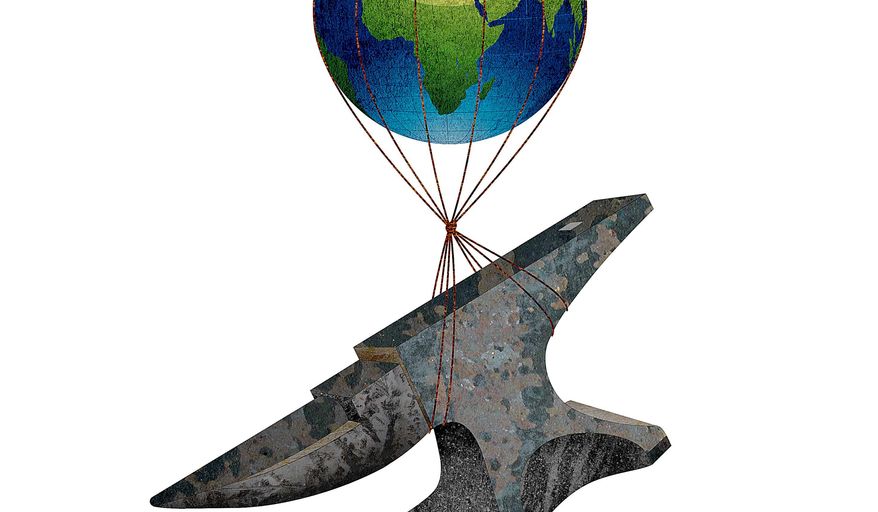U.S. INCREASINGLY RELIES ON POORER COUNTRIES TO FUND ITS WELFARE PROGRAMS
The U.S. and other rich countries are increasingly funding their government debts by sucking savings from those in poorer countries. This is starving much of the world of needed investment capital while enabling Americans to consume more at little cost. The International Monetary Fund has forecast global economic growth of only 2.5% this year, with the U.S. and China accounting for much of that growth, while Europe, Japan and most of Africa will barely show any growth at all. Much of the world’s population is getting poorer.
It was only in the last two centuries, after the advent of the Industrial Revolution, that most people looked forward to their children being wealthier than the current generation. Economic growth and rising living standards do not just happen. They are a function of what economists call capital formation, which is savings being invested in improved machinery and infrastructure and people being better trained with ever-increasing skill levels. This increases productivity and, if coupled with the rule of law and a nondestructive regulatory system, leads to a rising standard of living.
Savings and productive investment under a market economy tend to move to their highest and best use, and government authorities respect them. For the past four centuries, capital has tended to move to the United States primarily from Europe because rates of return were higher, and the U.S. legal and regulatory system did a better job protecting investment and other private property than most other countries.
Foreign investors can use their savings for direct investment in ventures and enterprises, portfolio investment in securities markets, purchasing government bonds, and for future consumption. Government bond sales, whose proceeds are used to fund transfer payments from one citizen to another — such as Social Security and various welfare programs, including subsidies on food, energy, transportation and housing — do nothing to increase productivity. Such subsidies are an economic drag because the interest payments on the bonds must eventually be paid for by higher taxes. As transfer payments increase relative to other government expenditures, economic growth tends to slow.
The world is faced with a situation where savings are increasingly used to fund non-wealth-creating transfer payments. But it gets worse. Modest savings made by individuals and institutions in poorer countries are increasingly sent to richer countries — most notably the U.S. — where interest rates are higher. The perception is that savings are safer because of better laws and systems to protect property rights.
In 2018, the U.S. net international investment position — the difference between U.S. residents’ foreign financial assets and liabilities — was about $8 trillion. By last year, it had grown to $18 trillion. That is, U.S. residents owed foreigners $18 trillion more than they were owed by others. Visualize an African businesswoman who owns a peanut processing plant. She takes part of her profits and puts them in her local interest-paying bank savings account. Through the miracle of global banking money transfers, part of her savings ends up being used to build a luxury apartment complex in Miami and pay Medicare disbursements for U.S. citizens. Neither one is a productive use of capital (no new wealth is created), but Americans are living better because of the efforts of the African businesswoman. If the savings had been used to fund a new semiconductor plant in America, or better yet Africa, real wealth would have been created, making everyone better off.
As noted, savings from people in poor countries are increasingly being sent to rich countries, where much of it is wasted on counterproductive government programs and funding consumption by the well-to-do. Recently retired World Bank President David Malpass, an exceptionally fine economist, has been warning about the situation in articles and speeches, and in meetings with world leaders. Mr. Malpass recently wrote: “Increased debt service payments are hitting at a time when financing flows to developing countries have reversed. This leaves developing countries providing more capital to the world than they receive.” If this sounds like Robin Hood in reverse, it is.
The U.S. government continues to run enormous budget deficits, with total government debt exceeding 100% of gross domestic product. If the government were forced to finance all that debt from domestic sources, interest rates, taxes and perhaps inflation would all be higher. Fortunately for the U.S., foreign investors typically buy one-quarter of U.S. government and other U.S. debt. These foreign investors, by using their savings to purchase U.S. debt, reduce the interest costs to U.S. citizens, which enables both the government and Americans, primarily upper-income ones, to spend more.
To restate, the savings of people in poorer countries are increasingly flowing to the U.S. as an unintended indirect subsidy to finance government and consumer spending. The global development goal of increasing economic growth and reducing inequality among countries in the interest of wider prosperity and peace is being totally upended by the growing deficits and debts of the rich countries — particularly the U.S. This situation is not going unnoticed and is causing growing resentment.
The constructive solution is for the rich countries to cease running big deficits. The destructive solution is for U.S. government officials to undermine property rights and the rule of law, as rogue New York Attorney General Letitia James is now doing with her vendetta against former President Donald Trump, thus driving away investors who seek legal security.
Without change, economic stagnation and attendant political instability will grow worse.
• Richard W. Rahn is chairman of the Institute for Global Economic Growth and MCon LLC.
https://www.washingtontimes.com/news/2024/mar/25/debt-crisis-us-increasingly-relies-on-poorer-count/
© Copyright 2024 The Washington Times, LLC.
